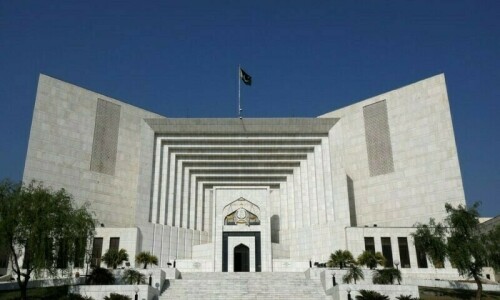ISLAMABAD: Justice Syed Hasan Azhar Rizvi, a member of the 15-judge full court that heard and decided the Supreme Court (Practice and Procedure) Act 2023 on Thursday, observed that the retrospective expansion of the right to appeal — a substantive right — raises significant apprehensions and threatens to disrupt the finality of judicial pronouncements.
“Such disruptions may have deleterious ramifications not only in terms of the orderly administration of justice but also with respect to the stability and predictability of legal decisions,” observed Justice Rizvi in his additional note.
Although Justice Azhar had upheld the constitutionality of the Practice and Procedure Act, he disagreed with the other judges on giving the right to appeal under Section 5(2) of the act with retrospective effect. He said his dissent was grounded in a conscientious examination of the potential consequences that such retrospective operation may yield.
On Oct 11, a 15-judge full court of the Supreme Court had upheld a law enacted by the PDM-led coalition government to regulate the affairs of the top court, but with a caveat that the right to appeal provided against decisions taken under Article 184(3) of the Constitution would not be applicable with retrospective effect.
Says provision will lead to endless claims and appeals related to ‘past and closed transactions’
The decision was a split verdict by the full court consisting of all 15 available judges which effectively rejected all the challenges to the Supreme Court (Practice and Procedure) Act.
Justice Rizvi observed that application of the right to appeal with retrospective effect would violate the parties’ fundamental rights because it had the potential to open a floodgate of claims and appeals pertaining to past transactions and settled legal matters.
“The law must concern itself with today’s rights and not yesterday’s,” Justice Rizvi explained.
A legislature cannot legislate today about a situation that occurred 30 years ago and ignore the march of events and the constitutional rights accrued in the course of that period, the judge observed. “It would be most arbitrary, unreasonable and a negation of history.”
It is against the fundamental right of fair trial as enshrined in Article 10-A of the Constitution, Justice Azhar said.
Today’s equals cannot be made unequal by saying that they were unequal 30 years ago and “we will restore that position by making a law today and making it retrospective”, Justice Rizvi emphasised.
Constitutional rights, constitutional obligations, and constitutional consequences could not be tampered in this way, he added.
Arbitrary and unreasonable
Justice Rizvi declared that Section 5(2) of the Act providing the right to appeal to an aggrieved person against whom an order has been made under Article 184(3) of the Constitution, before the Act took effect, was ultra vires under Article 8 of the Constitution as they offend Articles 9, 10, 10-A, 24 & 25 and are arbitrary and unreasonable.
The legislature is undoubtedly competent to legislate with retrospective effect to take away or impair any vested right acquired under existing laws, Justice Rizvi explained. “But every law enacted may not necessarily be tenable on the touchstone of the Constitution.”
It is the sole jurisdiction of the Supreme Court, under the law and the Constitution, to look into the fairness and constitutionality of an enactment and even declare it non est if it is found to be in conflict with the Constitution.
“Legislative competence alone is insufficient to make a law valid; it must also withstand the test of constitutionality to be enforceable,” Justice Rizvi said, adding that the failure to meet this standard renders the law invalid and unenforceable.
Normally the courts make utmost effort to save a piece of legislation from becoming invalid, but in certain cases, the courts also apply the doctrine of severance to remove a piece of legislation that distorts the scheme of a parent law or deviates from the Constitution, he added.
Justice Rizvi recalled that countless number of cases had been adjudicated by the apex court in exercise of its power under Article 184 (3) since the Constitution came into force in 1973.
It is a common practice that an aggrieved person is not satisfied unless he exhausts all the remedies available to him under the existing law. Even otherwise, a judgement or order passed under Article 184 (3) cannot be reopened and would be deemed to be a past and closed transaction, Justice Rizvi observed.
For this reason, introducing the right to appeal with retrospective effect raises a profound concern. This could further compromise the principle of res judicata and jeopardise the stability and predictability of the legal system, the apex court judge said.
It would open a floodgate of litigation and potentially overburden the Supreme Court with a daunting task of re-evaluating numerous pre-
settled matters or rights which had accrued on account of determination validly made under the then existing law, Justice Rizvi concluded.
Published in Dawn, December 29th, 2023















































Dear visitor, the comments section is undergoing an overhaul and will return soon.